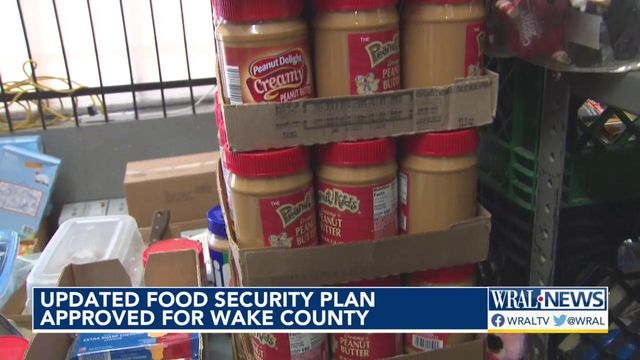Wake County Commissioners approve updated Food Security Plan
With over 37,000 children in Wake County struggling with food insecurity, Wake County Commissioners voted unanimously to add millions to various strategies to help
Posted — UpdatedWake County Cooperative Extension began the process of updating the 2018 Wake County Comprehensive Food Security Plan in June 2022. It comes to a total of $7,267,253.
According to the Food Bank of Central and Eastern North Carolina, 12% of people and over 37,000 children in Wake County struggle with food insecurity.
Melvin Acosta, the vice president of operations for Inter-Faith Food Shuttle, said the plan is sustainable and will better meet the needs of the community.
“We're bringing to the table the opportunity for us to have higher buying power, to have a reduction of duplicate services, as well as being able to tailor the plan and how we distribute food to the groups and communities we're serving," Acosta said. "[For example] We're bringing a mobile market into the Hispanic community, we can tailor that the people we serve, we reduce waste and we actually create a higher impact, because we provide food they will actually eat,”
The plan lays out eight strategies to make that the reality:
- Food Hub Support - Farmer & Partner Aggregation ($874,500.00). Develop capacity of local producers and aggregators to expand production, aggregate and store product, to meet higher demands for local produce and farm products.
- Communal Garden Support Grants ($67,500.00). Fund communal gardens in low-income areas, or those partnered with a Food Pantry, to add new gardens, expand or maintain operations, as well as educate residents and volunteers.
- Support Purchase of Local & Build Markets ($1,485,000.00). Develop self-sustaining capacity of emergency food partners to source more nutritious local food.
- Pantry Innovation Grants ($90,000.00). Create annual RFP for pantries for funding packages that would allow pantries to better meet client needs or expand regional partnerships and resource sharing.
- Expand Mobile Markets ($715,000.00). Expand mobile market programs to support more pop-up sites in hot-spots, and to develop pop-up sites with regular need as recurring mobile market locations.
- Tailored Services: Produce Prescription & Home Delivery ($2,158,200.00). Expand and increase effectiveness of emergency food relief models that get nutritionally and medically appropriate food directly to people’s homes.
- Community Health Workers ($700,696.00). Expand the Community Health Worker Program to reach more clients with language barriers and culturally specific concerns. Fund for two years.
- Collective Data Portal ($22,295.00). Develop online data portal to improve tracking of collective impact across partners.
Additionally, leaders of the development of the plan recommended support services:
- Food Justice Cohort & Food Justice Trainings ($102,500): Develop cohort of BIPOC individuals to guide food plan implementation and food policy work and offer two food justice training to expand community awareness of systemic racism’s effect on food systems.
- Food Security Plan Interns ($122,506.00): Provide paid internships annually to two individuals to assist with overall implementation of the plan as well as growth and diversification of the Capital Area Food Network.
It also mentions the need for an American Rescue Plan Administrative Assistant and the Continuation of Emergency Food Hubs
“The hope is to strengthen local farms, improve our tracking and development, and also align with the numerous partners and organizations that are already doing this work in the county,” said Sydney Klein-Mierop, the food security program manager for Wake County.
Klein-Mierop also said this new plan achieves two Wake County Board of Commissioner goals.
“A lot of times, oddly, the food system and local food work is done separately from emergency food and food access work,” Klein-Mierop explained. “We want to combine these in a singular approach.”
Related Topics
• Credits
Copyright 2024 by Capitol Broadcasting Company. All rights reserved. This material may not be published, broadcast, rewritten or redistributed.






